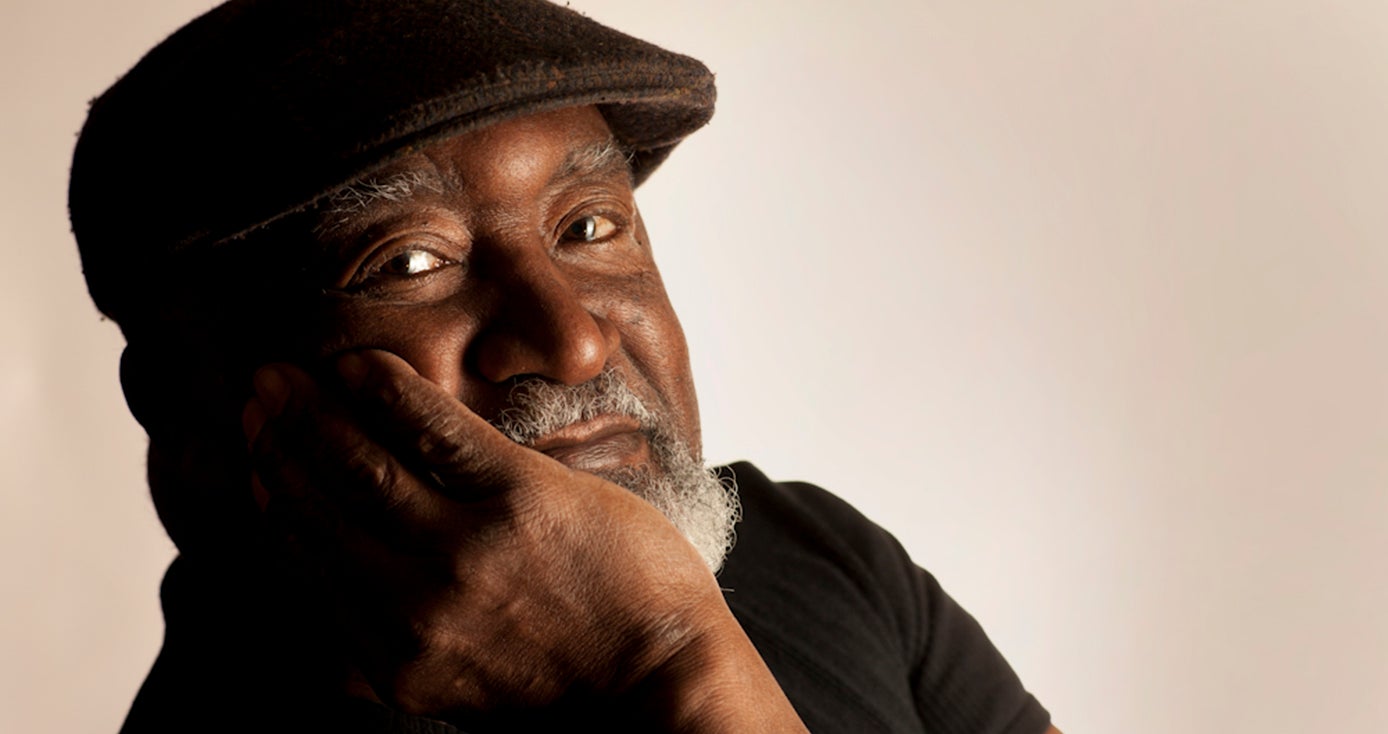
Subscribe to Pittwire Today
Get the most interesting and important stories from the University of Pittsburgh.Celebrating the Power of Black Artistry
At the age of 91, Thaddeus Mosley devotes as many as eight hours a day to his life’s work: sculpting.
“When I was a younger man, it was a great deal more than just eight hours, but I can’t work quite as much as I did when I was in my 80s,” joked Mosley, a self-taught sculptor and a 1950 graduate of Pitt’s Kenneth P. Dietrich School of Arts and Sciences.
At one point during his 60-year career, Mosley worked as many as 12 hours per day in one of his multiple studios. He describes himself as a “simple bystander,” never knowing where the artistic journey will take him.
Save the date
Upcoming Black Futures events hosted by the Center for African American Poetry and Poetics include:
Wednesday, Nov. 8, at 6 p.m.
Cathedral of Learning
Poets r. erica doyle, francine j. harris, Douglas Kearney and Ronaldo V. Wilson present works in progress with substantial audience engagement. Details here.
Wednesday, Nov. 8, at 7:30 p.m.
Frick Fine Arts Auditorium
A tribute to Thaddeus Mosley with r. erica doyle, francine j. harris, Douglas Kearney and Ronaldo V. Wilson.
Thursday, Jan. 18, at 7:30 p.m.
Location TBA
A reading, lecture and conversation with poet Fred Moten and visual artist Latoya Ruby Frazier. Details here.
Thursday, March 1, at 7:30 p.m.
Location TBA
A reading, lecture and conversation with poet Carl Phillips and visual artist Laylah Ali. Details here.
“When I begin a new project, I usually have no idea what that piece of art will turn into. Usually, the art finds itself, and the only way for it to find itself is for me to sit down with it, spend valuable time with it as it discovers what it wants to be."
Mosley, widely known for work inspired by a wide range of cultural expressions, including African tribal art, American jazz music, Japanese architecture and Italian landscape art, will be honored this week by the University of Pittsburgh.
Granted by the Dietrich School, the Distinguished Professional Achievement Award recognizes outstanding Pitt alumni for both their career accomplishments and their record of public service. Past recipients of the distinction have included best-selling author Michael Chabon, presidential historian Bert A. Rockman and Lawrence J. Simpson, noted musician and chief academic officer at the Berklee College of Music in Boston.
The award will be formally presented to Mosley at 7:30 p.m. on Wednesday, Nov. 8. The presentation is part of Black Futures, a yearlong series of events highlighting the work of diverse African-American poets, artists and performers and stimulating conversations around the power of Black art to imagine new futures.
Black Futures is presented by Pitt’s Center for African American Poetry and Poetics, part of the University’s Department of English. The center opened in 2016 as a creative think tank devoted to highlighting, promoting and sharing the poetry and poetic work of African-American and African diasporic writers.
To honor Mosley, four visiting poets will also present short new works celebrating his legacy, which includes prominent solo exhibitions in such venues as Pittsburgh’s Carnegie Museum of Art and the Cue Art Foundation Gallery in New York City. Most recently, Mosley is featured in the 2018 edition of the Carnegie International; the accompanying exhibition, launching next fall, serves as a survey of the international contemporary arts scene.
Mosley’s sculptures can be found within Pittsburgh’s communities. While he is adamant about making overt political statements with his work, Mosley’s art often carries a message of hope and inspiration for the city’s citizenry.
The Phoenix, perhaps Mosley’s most widely recognized local sculpture, is a 14-foot cedar structure standing prominently in the heart of the Hill District that symbolizes the local Black community rising from the ashes of the 1968 Pittsburgh riots. The Mountaintop, encircled by a paved pathway outside of the Hill District’s Carnegie Library, commemorates the ideals of the late civil rights leader Martin Luther King Jr., acknowledging the strides Pittsburgh’s African-American community has made to get to the top of the proverbial mountain referenced in King’s “I Have a Dream” speech.
“Like any artist, my ideals and values are found within my art. I am passionate about a lot of things, but I try to keep the focus of my work uplifting and artistic,” said Mosley, the son of a coal miner and a seamstress. “Western Pennsylvania has always been my home, and it is a beautiful place. I was here when Pittsburgh was at its lowest, and I’ve seen it be the envy of the nation. I feel my art reflects all of those times in various ways.”
The Dietrich School’s recognition is the latest tribute to Mosley from his alma mater. In 2012, Pitt dedicated its annual K. Leroy Irvis Black History Month Celebration to the world premiere of Pitt alumnus Kenneth Love’s documentary on Mosley’s life and career. Additionally, the University of Pittsburgh Press published David Lewis’ “Thaddeus Mosley: African-American Sculptor” in 1997.
Kathleen M. Blee, the Dietrich School’s Bettye J. and Ralph E. Bailey Dean as well as dean of the College of General Studies, said, “The story of Thaddeus Mosley is a heartwarming tale of personal perseverance and professional excellence that every Pitt alumnus, faculty and staff member, and student can appreciate. We are proud of him and his life’s accomplishments. It is our honor to bestow Thaddeus Mosley with Pitt’s 2017 Distinguished Professional Achievement Award.”


